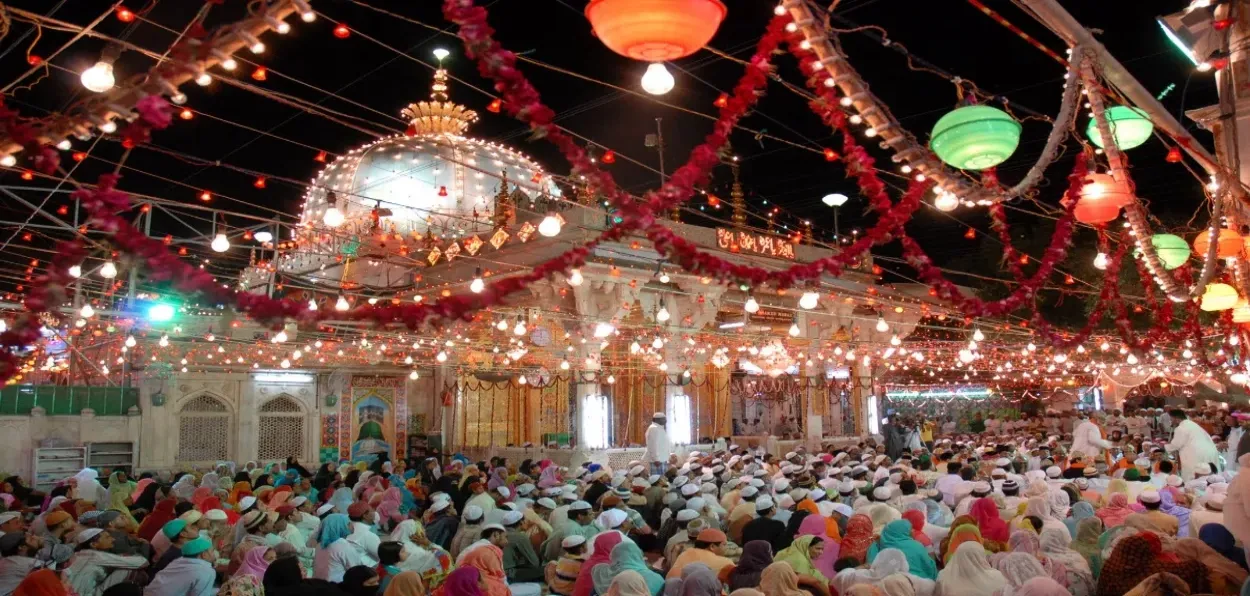
Amir Suhail Wani
The city of Ajmer, located in the Indian state of Rajasthan, is home to one of the most revered pilgrimage sites in the world – the Ajmer Sharif Dargah. This sacred shrine is dedicated to Khwaja Moinuddin Chisti, a Sufi saint whose teachings of love, tolerance, and peace have left an indelible mark on the spiritual landscape of the Indian subcontinent and beyond.
The Saint of Peace
Khwaja Moinuddin Chisti, also known as Khwaja Sahib and Gharib Nawaz (the benefactor of the poor), was born in 1141 CE in the region of Sistan (modern-day Iran). He came from a well-respected and scholarly family. However, he chose to follow the path of spirituality early in his life, seeking solace in the teachings of Islam and Sufism. His journey took him through the Middle East before arriving in India in 1192 CE, a time when the region was witnessing significant political and cultural changes under the Delhi Sultanate.
After experiencing numerous spiritual trials and seeking divine guidance, Khwaja Moinuddin Chisti settled in Ajmer, a place which he believed was blessed by the divine. His devotion to God and his commitment to serving humanity became the foundation of his legacy. His teachings focused on selflessness, compassion, and the importance of human welfare. His emphasis on tolerance, irrespective of caste, creed, or religion, made him a unifying figure who transcended religious divides.
Khwaja Moinuddin Chisti was known for his acts of kindness, and his spiritual gatherings attracted people from all walks of life. He was particularly drawn to the poor, the downtrodden, and the needy, offering them solace and hope through his teachings. His presence in Ajmer turned the city into a significant spiritual center that still attracts millions of devotees from around the world.
Khwaja Chisti’s passing in 1236 CE marked the end of an era, but his legacy continued to spread, particularly through his disciples. His message of universal love and his commitment to peace have inspired not only Muslims but also people of different religious backgrounds.
Ajmer Sharif Dargah: The Spiritual Beacon
The Ajmer Sharif Dargah is the tomb of Khwaja Moinuddin Chisti, located in the heart of Ajmer. The shrine is not just an architectural marvel but also a profound symbol of his enduring presence and influence. The Dargah stands as a beacon of spirituality, attracting pilgrims from all over the world, irrespective of their religious affiliations.
The shrine complex is an oasis of tranquility, offering a serene environment for reflection and prayer. The architecture of the Dargah is a blend of Indo-Saracenic and Mughal styles, with elements that showcase the rich cultural amalgamation of India’s diverse heritage. The main structure is a large, white marble mausoleum that houses the tomb of the saint. Surrounding this central structure are several other buildings, including the Jannati Darwaza (Gate to Paradise), Langar Khana (the kitchen that serves free meals to the poor), and The Sufi Courtyard where many rituals are performed.
The Dargah is an embodiment of the saint’s message of love and inclusivity. Visitors can see people of all faiths coming together to pay their respects, offering prayers, and seeking blessings. It is a place where devotees believe that Khwaja Moinuddin Chisti’s spiritual energy continues to heal and inspire, with many attributing miracles and divine intervention to their visits.
The Dargah is also famous for the Urs festival, which marks the death anniversary of Khwaja Moinuddin Chisti. This annual event is a grand celebration, attracting millions of pilgrims and devotees. During the Urs, a series of spiritual ceremonies, including qawwali (Sufi devotional music) performances, prayers, and processions, take place. The atmosphere is electric with devotion as people from various parts of the world gather to celebrate the life and teachings of Khwaja Sahib.
The Ajmer Sharif Dargah stands not only as a center of spiritual reverence but also as a symbol of India’s rich Sufi heritage. Sufism, the mystical dimension of Islam, seeks a deep, personal connection with the Divine, often expressed through poetry, music, and dance. Khwaja Moinuddin Chisti’s teachings emphasized these values, and his influence can be seen in the many Sufi shrines across India and the world.
The Dargah plays a crucial role in fostering communal harmony in a diverse and pluralistic society like India. It serves as a bridge between different communities, as it welcomes people of all faiths, irrespective of their background, caste, or creed. It is a living testament to the power of devotion, peace, and love in a world often marked by division.
READ MORE: Why is Kolkata celebrating yet another Christmas?
The Ajmer Sharif Dargah and Khwaja Moinuddin Chisti’s legacy continue to be powerful sources of inspiration for millions of people worldwide. His life and teachings emphasize the universal values of love, compassion, and humility, transcending the boundaries of religion and culture. The Dargah stands as a vibrant testament to these values, offering a space for reflection, prayer, and connection to the divine. For those who seek peace, solace, and spiritual fulfillment, the Ajmer Sharif Dargah remains an eternal destination of love, faith, and devotion.
